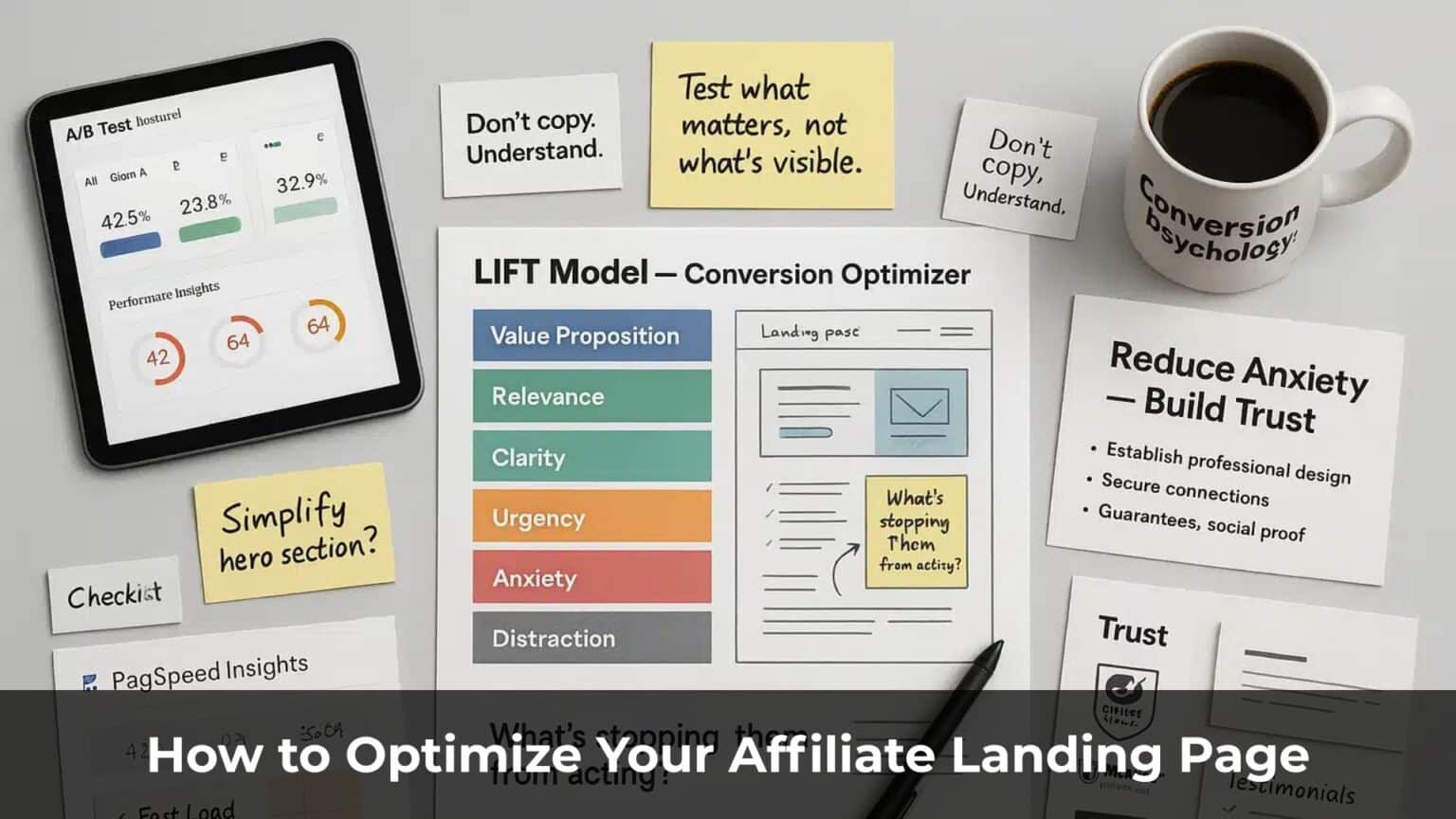Affiliate marketing isn’t something you’re born good at.
It’s a skill-based game — and to win, you need to level up across multiple areas.
Most affiliate marketers start solo.
In the beginning, you’re not just the advertiser.
You’re the copywriter, the media buyer, the analyst, the negotiator, the accountant, and sometimes even the team leader — all at once.
You’ll need to write compelling ads, manage your cash flow, negotiate better deals, build and lead a team (if you scale), and solve problems every single day.
It’s a fast-moving field — and only those who keep growing their skills stay in the game.
Table of Contents
ToggleGrow Like a T-Shaped Marketer
There’s a concept in business called the “T-shaped” model.
It means going deep in one core skill — while also having a broad understanding across other areas.
When people ask me what skills you need to succeed in affiliate marketing, my answer is:
At first, just grit. Show up every day. Be consistent. Be resilient.
But over time, if you want real success — the kind that scales — you’ll need more than hard work.
You’ll need to build a solid foundation of skills.
Here are the key skills I’ve seen over the years that separate the struggling affiliates from the profitable ones:
Problem-Solving and Decision-Making
Affiliate marketing is a never-ending series of problems to solve.
Click loss spiked last night? You have to fix it.
A new competitor just took over your best placements? You need to adapt — fast.
The hardest part? Most of the time, you’re on your own.
There’s no detailed guide. No one’s going to hold your hand.
Your competitors might know the answer — but you’re not about to show them your campaign data.
And even if you identify the issue, the real challenge is making the right call.
Most people make decisions based on emotions — not data.
They pick a niche because it “feels right,” not because the numbers back it up.
That’s why improving your decision-making is so important.
Here are a few ways to get better at it:
- Study psychology — especially cognitive biases.
- Use decision tools like logic trees and mental models.
- Think strategically — get expert input, list all your options, and choose based on facts, not feelings.
Problem-solving and decision-making are learnable skills.
The better you get, the faster you’ll grow.
Creative Thinking & Marketing Skills
This is affiliate marketing — so marketing is the most important skill you can have.
Creativity helps you come up with fresh angles, unique hooks, and campaigns that stand out.
Sure, you can make money copying what others are doing. But my most profitable campaigns were always the ones I created myself — the ones where I tried something new.
It’s not just about finding a good angle.
You also need to write ads that grab attention and move people to action.
That requires solid copywriting skills — and a deep understanding of how people think.
Think about it:
Your ideal customer, let’s say John, is scrolling through Facebook to kill time.
Why would he suddenly pull out his credit card and spend $50 on your offer?
If you want that to happen, your marketing needs to be sharp.
It needs to tap into the emotions and motivations that drive action.
How do you get better at marketing?
Start by studying the psychology behind buying decisions.
What motivates people? What words make them act?
Then, learn copywriting.
Watch how top marketers write headlines, frame ideas, and lead people to take action.
Marketing is a skill — and the better you get, the more profitable your campaigns become.
Tech & Tool Proficiency
You don’t need to be a full-stack developer to succeed in affiliate marketing — but you do need some basic technical knowledge.
At a minimum, you should know how to build a landing page, set up your tracking properly, and troubleshoot the common problems that come with launching campaigns.
These are the building blocks of a functional affiliate setup.
I have a friend who’s a brilliant programmer — and he uses his tech skills as serious leverage.
A few months ago, he showed me his custom-built ad optimization system. It automatically adjusted his bid strategies, tracked performance in real time, and displayed everything on a dashboard that only allowed team members to access the parts they needed. I was blown away.
Now, most affiliates don’t need to go that far.
You can absolutely outsource the tech side if you’re at that level.
But here’s my advice: at least learn the basics.
Even understanding simple coding logic or how an API works can give you more control — and help you collaborate better with developers or software tools.
A great starting point is CodeAcademy.com, but there are also plenty of free resources on YouTube and Reddit.
Knowing just a little bit of code can go a long way in this business.
Social Skills (Yes, Even in Affiliate Marketing)
Affiliate marketing is often seen as a solo game.
You don’t need to talk to customers, host meetings, or post on social media all day.
But here’s the truth: Good social skills are still a huge advantage.
Some of my biggest wins came not from ads or funnels — but from relationships.
An affiliate manager once gave me insider insights that helped me spot shifts in the market before anyone else.
Partners I teamed up with taught me things I never would’ve learned on my own.
Even traffic source reps have shared behind-the-scenes info — the kind of stuff you won’t find in any forum or blog post.
Most affiliates are introverts.
We like to work in silence, figure things out alone, and stay in our own lane.
That’s fine. But if you can build even a few strong relationships in this space, it can unlock major opportunities.
Here’s a simple rule:
Treat people the way you want to be treated.
Be respectful, clear, and professional — especially when dealing with affiliate managers.
And please — don’t be the kind of guy who creeps out female reps.
This is a business. Act like it.
Campaign Analysis & Data-Driven Thinking
Affiliate marketing is not just about launching ads.
It’s about constantly buying traffic — testing, analyzing, optimizing — and repeating the process over and over again.
And here’s the truth:
The data tells the story.
Conversions reveal the type of people who are buying.
Split tests show you which ads are performing better.
Analytics uncover patterns:
- Are your profits stronger at certain hours of the day?
- Does Android traffic convert better than iOS?
- Are certain geos or devices underperforming?
Every metric is a clue.
The more you drill down into your campaign data, the more you’ll see what’s working — and what needs to change.
Back in the day, I used to download raw SubID data and manually crunch the numbers in Excel.
It was time-consuming, but it trained me to think in numbers, not opinions.
Today, things are easier.
You’ve got powerful tracking tools like Voluum, BeMob, and RedTrack — they automate most of the work and give you clear dashboards.
No excuses now.
But tools alone won’t help unless you build the mindset to analyze your data and take action based on it.
Marketing is emotional.
But decision-making should be rational.
You don’t scale based on gut feelings — you scale based on numbers.
If you want to win long term, develop your ability to read the data, find patterns, and act with clarity.
The affiliates who master this skill don’t just survive — they thrive.
Financial Discipline & Cash Flow Management
Money management is one of the most underrated — yet most critical — skills in affiliate marketing.
Your cash flow is the lifeblood of your business. If it dries up, your campaigns die with it.
It’s easy to get caught up in the excitement of “$10,000 a day” profit screenshots.
But remember: gross profit is not the same as net income.
You still need to account for ad spend, software subscriptions, virtual assistants, tracking tools, taxes, and all the costs that come with running a real business.
Then there’s the unpredictable nature of this game:
Some campaigns will fail.
Some advertisers will pay late.
Some traffic sources will suddenly tank your performance.
That’s why you must get serious about tracking your numbers — not just your revenue, but your actual profit and loss.
Personally, I keep a close eye on my bank account every week.
I know exactly when each advertiser is supposed to send payouts, and I immediately follow up on any delays.
If I’m no longer using a traffic source or tool, I cancel it. And if I’ve prepaid for something I won’t use, I ask for a refund.
Here’s another habit that’s kept me in the game longer than many:
Live below your means.
I know — you’ve probably heard this advice a hundred times.
But I’ve seen too many affiliates burn out because they started living a lifestyle they couldn’t sustain.
They bought cars, rented apartments, and spent money like their best day was going to last forever.
It didn’t.
Affiliate marketing can be wildly profitable, but only if you treat it like a business.
Use your money to grow — not to show off.
High Productivity & Speed
Everyone gets 24 hours a day — but not everyone uses them the same way.
People often tell me they admire my discipline.
What they don’t realize is that I used to be one of the laziest students in college.
I wasn’t born productive.
I had to train for it — just like any other skill.
I started hitting the gym. I practiced meditation.
I blocked social media during work hours.
I trained myself to work in 50-minute deep-focus sessions, no distractions.
And when my productivity improved, something powerful happened:
In just 4 hours, I was getting more done than most people could in 10.
I’ve met a lot of talented affiliate marketers over the years — people who could’ve easily dominated the game.
But many of them only operate at 10% of their full potential.
Why?
Because they struggle to focus.
They lack energy.
They keep getting distracted.
They wait for motivation to magically appear.
Affiliate marketing rewards speed.
The faster you test, optimize, and launch — the faster you learn and earn.
And that only happens when you build a system that supports high-performance work.
If you want to win long term, you can’t rely on motivation.
You need structure, habits, and the ability to get things done — even on the days you don’t feel like it.
Leadership & Team Management
Sooner or later, you’ll hit a ceiling doing everything on your own.
That’s when leadership becomes essential.
Almost every super affiliate I know runs a team.
At some point, they realized that scaling a business means building systems — and systems need people.
In my case, I eventually hired team members to help manage my campaigns, virtual assistants to handle repetitive tasks, and even some key staff for day-to-day operations — like a personal assistant, a household manager, or someone to help coordinate logistics.
But here’s the truth:
Leading a team isn’t easy.
It’s not just about hiring someone and expecting things to work out.
Leadership is a skill in itself.
You need to delegate clearly, train people effectively, keep them motivated, and solve problems as they come up.
Sometimes you’ll need to step in, other times you’ll need to step back.
The better you become at building and leading a team, the faster you can scale — without burning out.
Affiliate marketing may start as a solo sport.
But if you want to grow beyond a certain point, leadership isn’t optional. It’s required.
Feeling Overwhelmed by All These Skills?
You might be thinking:
“That’s a lot to learn… do I really need to master everything?”
The good news is — no, you don’t.
You don’t have to be an expert at every skill on this list.
Some skills are more critical than others, and many can be outsourced.
For example, I’m terrible at anything technical.
Instead of forcing myself to learn coding or server setup, I simply hired someone to handle that part of the business — so I could stay focused on what I do best.
At the same time, I constantly worked to improve other core skills — like problem-solving, data analysis, and marketing.
Another way to cover your weak spots is by building a team with complementary strengths.
Let’s say you’ve got three disorganized team members. The solution? Hire one operations-minded person to bring order to the chaos.
In fact, one thing I’ve noticed in affiliate marketing is this:
People with opposite skill sets often make the best teammates.
You might have someone who’s great at communication, another who’s amazing with numbers and systems — and together, they form a highly effective, balanced team.
If you’re just starting out, the key is to stay humble.
Yes, being a developer gives you a real advantage.
But don’t fall into the trap of thinking one strength is enough.
To succeed in affiliate marketing — especially at scale — you’ll need to keep learning and evolving across multiple areas.
Final Thoughts
A thousand-mile journey begins with a single step.
No one is born with all the skills to succeed in affiliate marketing.
You learn. You practice. You grow — one step at a time.
If you feel like you’re missing key skills right now, that’s okay.
What matters is having a plan to improve — and taking consistent action toward it.
When I started in affiliate marketing, I didn’t have any of these skills.
I built them one by one, slowly, over the years.
And over time, those small improvements stacked up and led to real results.
This business rewards those who keep going.
So wherever you’re starting from — start there.
The skills will come, if you keep moving forward.













